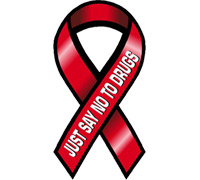International Day Against Drug Abuse and Illicit Trafficking- June 26
Unless we reduce the demand for illicit drugs, we can never fully tackle cultivation, production or trafficking. Governments have a responsibility to counteract both drug trafficking and drug abuse, but communities can also make a major contribution. Families, schools, civil society and religious organizations can do their part to rid their communities of drugs. The media can raise awareness about the dangers of narcotics. -UN Secretary-General Ban Ki-moonThe International Day against Drug Abuse and Illicit Trafficking is a United Nations International Day against drug abuse and the illegal drug trade. It has been held annually since 1988 on 26 June, a date chosen to commemorate Lin Zexu's dismantling of the opium trade in Humen, Guangdong, just before the First Opium War in China. The observance was instituted by the General Assembly resolution 42/112 of 7th December, 1987.
 Despite the continued and increased efforts by the international community, the world drug problem continues to pose a serious threat to public health, the safety and well-being of humanity, in particular young people, and the national security and sovereignty of States, and that it undermines socio-economic and political stability and sustainable development.
The use of drugs harms individuals, families and society at large. Drugs control the body and mind of individual consumers, the drug crop and drug cartels control farmers, trafficking and crime control communities.
Despite the continued and increased efforts by the international community, the world drug problem continues to pose a serious threat to public health, the safety and well-being of humanity, in particular young people, and the national security and sovereignty of States, and that it undermines socio-economic and political stability and sustainable development.
The use of drugs harms individuals, families and society at large. Drugs control the body and mind of individual consumers, the drug crop and drug cartels control farmers, trafficking and crime control communities.Teenagers and young adults are mainly vulnerable to using illicit drugs. The prevalence of drug use among young people is more than twice as high as that among the general population. At this age, peer pressure to experiment with illicit drugs can be strong and self-esteem is often low. Also, those who take drugs tend to be neither aware of the health risks involved.It hinders the psychological and emotional development of the individuals.
Drugs should be used exclusively for medical and scientific purposes, given the adverse effects their abuse and trafficking have on health and society. These illicit drugs include amphetamine-type stimulants (ATS), coca/cocaine, cannabis, hallucinogens, opiates, and sedative hypnotics.


